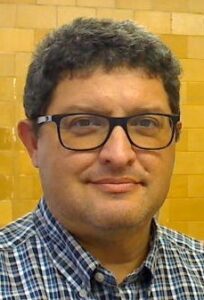Dr. Ruben Delgado is an Associate Professor in the Department of Atmospheric and Planetary Sciences at Hampton University. He holds a B.S., M.S. and Ph.D. in Chemistry from the University of Puerto Rico-Rio Piedras. His research interests focus on the integration of in-situ ground meteorology and chemical composition measurements with lidar and satellite remote sensing technology to study the coupling of chemistry and dynamics in the fields of air quality, wind energy and meteorology. He is the Principal Investigator (PI) of the Hampton University Lidar Laboratory, Unified Ceilometer Network (UCN), NOAA CESSRST at Hampton University and the Team Leader in NASA’s Increasing Participation for Minority Serving Institution program. He is the Vice-Chair of the American Meteorological Society Committee on Laser Atmospheric Studies, the University Corporation for Atmospheric Research Members Nominating Committee and a member of the World Meteorological Organization (WMO) Vegetation Fire and Smoke Pollution Warning Advisory and Assessment System (VFSP-WAS) Wildfire Risk Forecast working group and the North American WMO VFSP-WAS Fire and Smoke Observation Working Groups.
Research interests focus in atmospheric chemistry and physics, and laser remote sensing technology. Elastic, Raman, and Doppler wind lidar measurements are integrated with satellite retrievals, ground based concentration measurements of gases and aerosols, and numerical weather prediction models to reach a thorough understanding of the coupling of chemistry and dynamics in air-land-marine interactions. He has served as PI in multiple proposals and field campaigns in air quality and wind energy. He is PI of multiple NASA funded research projects to derive Planetary Boundary Layer Parameters from lidar and satellite measurements, Geoscience Research Experiences with NASA Earth Science Ground Networks (AERONET, PANDORA and GPM) and Lidars (TOLNET, DaWN/AWP).
Research Projects
Lidar Remote Sensing: Dr. Delgado has expertise with instrumentation, analysis and retrievals of elastic, Raman and Doppler lidar remote sensing technology of troposphere aerosols, water vapor, clouds and winds, for air quality, meteorology and wind energy applications. This provides in near real time optical, physical and chemical composition and characterization of aerosol/particle pollution and planetary boundary layer dynamics. Expertise also includes ground-based lidar/ceilometer networks, validation of satellite and forecasting models, wind resource assessment and improvement of turbine power production estimates with machine learning tools.
Air Quality Observing System – Measurements and analysis from in-situ/ground, remote sensing (lidar, radar, radiosondes, AERI) and column (ground/satellite measurements) of meteorological variables and air chemical composition are carried out to determine the relative impact of long-range transport versus local emissions during pollution events. This synergetic approach provides a comprehensive 3D monitoring of particle pollution (e.g., aerosols, smoke, dust, etc.), gases and meteorological variables in the Mid-Atlantic United States and that can be expanded throughout the United States. This aids future policy decisions and strategies as the remote sensing observations contribute to provide answers on the influence of gases and aerosols in air quality, atmospheric composition, and climate. Dr. Delgado is a member of the World Meteorological Organization (WMO) Vegetation Fire and Smoke Pollution Warning Advisory and Assessment System (VFSP-WAS) Wildfire Risk Forecast working group.
Environmental Justice: Disparities in Air Quality – Results from receptor models of source apportionment of pollution are correlated to Census population and socio-economic data. This project includes plans to leverage existing relationships with community organizations to enable effective risk communication strategies and to develop scientific literacy. To this end, Dr. Delgado will be collaborating with Dr. Daniel Orozco (National Parks Conservation Association) and Grace Holmes (VA Dept. of Enviromental Quality), to facilitate workshops for local state and federal stakeholders in air quality, energy, and natural resources to build community engagement and integrate stakeholders in state and federal environmental, energy and natural resources agencies. Students will be able to contribute to the Tidewater Air Monitoring Evaluation (TAME) project studying the potential health risks associated with dust coming from nearby coal storage and transportation facilities in communities located in Lambert’s Point and the East End, in Norfolk and Newport News, respectively.
Wind Energy – The behavior of the wind in a marine/coastal environment is complex, and often not well measured, modeled, nor understood; thus, significant preconstruction energy yield uncertainties may be introduced when estimating a local wind resource and a turbine’s available power. Dr. Delgado has participated in various wind energy field campaigns sponsored by NOAA, DOE, NSF. His expertise in ground based remote sensing measurements contribute to the reduction of uncertainties and improve wind power prediction in research areas associated with wind resource characterization, measurements and farm layout:
1-Uncertainty reduction in offshore wind resource characterization & turbine available power along US East Coast;
2-Validation & improvements in Numerical Weather Prediction model estimates of offshore and coastal wind resource;
3-Improvement of wind power prediction from meteorological characterization with machine learning models.
Unified Ceilometer Network (UCN) – Dr. Delgado is the Principal Investigator for this network that came as result of the US EPA entrusting him and his team with the creation and management of the lidar/ceilometer data quality control and assurance, retrievals, data visualization and portal for their Photochemical Assessment Monitoring Stations network. UCN provides students the opportunity to have multidisciplinary academic and research experiences. The network is a collaboration US EPA, NASA, and NOAA on a ground-based ceilometer network to support activities that will provide a comprehensive three-dimensional assessment of the chemical and dynamical processes in the lower atmosphere that can aid future policy decisions and strategies to key questions on the influence of gases and aerosols in air quality, atmospheric composition and climate, as well as the validation/verification of satellite and modeling products. A total of 47 local, state, federal agencies, and nine academic institutions currently participate with over forty locations contributing and providing extensive observational coverage across North America. Dr. Delgado has deliberately engaged Minority Serving Institutions in this effort to promote Diversity, Equity and Inclusion and broadening their participation in Earth systems science and remote sensing technology. This opportunity allows Dr. Delgado to be heavily engaged with the national and international community in initiatives such as:
- ASTM International: Standard Guide for Mixing Layer Height from Laser Based Ceilometers
- U.S. EPA Methods Document/Quality Assurance Project Plan (QAPP): Quality Assurance for Ground Based Ceilometer
- European Cooperation in Science & Technology: PROfiling the atmospheric Boundary layer at European scale (PROBE)
Dr. Delgado scholarly and research capacity developed in UCN provides a solid foundation, key to the advancement of Earth Science and Weather Observation Networks.

